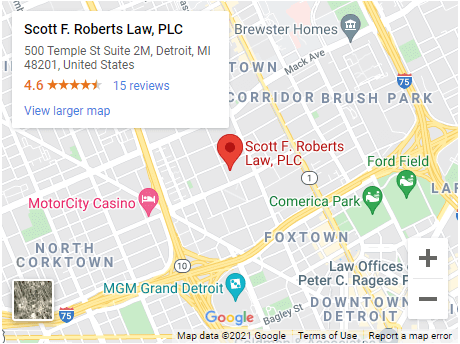The recent distinction of industrial hemp and products made from it as a separate agricultural crop from cannabis has spurred many Michiganders to get involved in growing industrial hemp. As a less expensive viable alternative to many fibers and plastics, industrial hemp is ready to launch into the commercial scene. The Michigan cannabis attorneys of Scott Roberts Law Firm are here to help you navigate the rapidly growing industrial hemp market of the state.
In addition to commercial product use, certain industrial hemp products are generally recognized as safe by the FDA, allowing for human consumption without the extra inspections required for cannabis food products.
If you want to get in on this ripe aspect of the legal cannabis industry, you’ll want to pay close attention to the Michigan Department of Agriculture and Rural Development (MDARD) record keeping process and provide any necessary employee training to ensure your hemp production stays compliant. It may seem like a lot to manage, but this article will show you that following MDARD’s rules is easy and will ultimately benefit your hemp grow operation.
Registration
MDARD has shut down many industrial hemp farm operations when they request a copy of a grower’s registration and the grower cannot produce it. This is essentially a matter of maintaining an adequate record keeping system that allows you to locate documents important to your operation.
Keeping track of your grower registration can save you many headaches down the line as industrial hemp grower registrations are required to do anything with the crop in Michigan. From planting and harvesting viable products to selling to processing or safety compliance facilities, nothing happens if MDARD cannot verify your registration at any time.
Farm Operation Acreage Reporting
As an industrial hemp grower, your farm will receive less inspection than a cannabis grow farm overall, but not without initial regulations to comply to. After you get your Michigan registration you have to verify a variety of information with Farm Service Agency (FSA) of the United States Department of Agriculture.
This process makes you an authorized industrial hemp farm the United States which is very helpful when a certain US tax entity (the IRS) comes around for an audit or an inspection. To comply with the FSA requirements, growers must report their farm address, total acreage of the crop field or square footage if using an indoor grow operation, as well the GPS coordinates of every location on the farm where hemp will be grown.
Lastly, FSA regulations require your Michigan industrial hemp registration number and your intended use for the crop. Again, a proper record keeping system will make following these rules a simple task. The FSA suggests keeping records of when you submit this information as well as any confirmation that it was received by the agency.
Grower Sales
An industrial hemp farm can only sell its raw product to a safety compliance facility or a processing operation with a license from MDARD or the Marijuana Regulatory Agency (MRA). Each of these sales must be precisely recorded and those records must be maintained for five years to avoid violation.
Sales Records Requirements
- Name and license number of the processor or safety compliance facility purchasing the industrial hemp.
- Total weight of industrial hemp sold.
- Total price for each sale of industrial hemp.
- Date of sale.
- Certified Test Report of THC content for each lot sold, identified by variety (commonly known as Certificate of Analysis).
Most of this information makes sense for an industrial hemp grower to keep track of anyways, but these record keeping rules will ensure growers stay on top of their production and sales.
Grown Hemp Variety
A simple record of every name of the strains of hemp grown at your facility must be maintained. This type of record again makes sense for an industrial hemp grower to keep track of, so this law should be an easy one to follow.
Purchases of Viable Hemp Products
Similar to requirements for sale of raw industrial hemp and its products in Michigan, some purchases made by an industrial hemp grower must be kept track of in their records. Not every purchase related to your facility has to be recorded, such as production equipment, but record of every purchase of a hemp product and what variety of hemp it is must be kept for at least five years.
Hemp growers often purchase seeds, transplants, or clone plants to assist in their grow production. If you are a hemp grower who has bought any viable hemp from another producer you have to record the name of the individual or facility as well as the active mailing address of the seller. These records must also be kept for five years in case of an MDARD or USDA inspection.
Disposal and Remediation
There are many different issues that could lead to an entire hemp harvest being disposed of, not every cause of disposal must be reported, but this process must also be done according to the rules. To properly dispose of a non-compliant hemp lot in Michigan, a grower like yourself has to go online to Grower’s Notice of Intent to Dispose to notify MDARD of the disposal.
This permits a grower to rid themselves of non-compliant lots, either from improper THC levels after the biomass remediation and removal of cannabis flower material or a general order from MDARD to dispose of certain hemp crops. However, disposals that occur to compliant lots as a result of contamination, pest infestation, or inclement weather do not need to reported.
Non-Compliant Lot Disposal
Obviously it is preferable to only maintain compliant hemp lots, but when this is not possible, Michigan makes sure industrial hemp growers recognize their error through the multi-stepped disposal process. This process requires the grower to submit the intent to dispose form no more than two days before the disposal and then a separate notice of disposal no more than two days after the disposal.
If a MDARD representative witnesses the disposal, you don’t have to submit the notice of disposal. However, if there is no witness, you must report the date of disposal, the method or equipment used for the disposal, the total acreage disposed of, the reason for disposal, as well as photographic evidence of the actual disposal. Just as all records for hemp growers, these must also be maintained for five years, a complete checklist for the Michigan disposal process can be found here Technical-bulletin.
Non-Compliant Lot Remediation
An alternative do disposal is an option to remediate the non-compliant hemp crop in order to salvage compliant biomass material that can be used and sold for commercial product use in Michigan. A grower must submit a remediation sampling request online when choosing to remediate a non-compliant hemp lot. Remediation can performed in two ways: either by shredding all plants into viable biomass or removing and disposing of all floral cannabis material while retaining leaves, stalks, and seeds for commercial use.
The remediated material must be sampled by MDARD to check the THC level. Depending on the remediation option chosen, an inspector will either collect a biomass sample, or collect a non-floral material sample AND monitor disposal of the floral material. This inspection will serve as the notice of disposal for the floral material if that was chosen remediation method. Records of all remediations must kept for five years which will assist with the annual crop reporting required by Michigan law.
MDARD Annual Reporting
In addition to all the requirements thus far, the USDA requires an annual report of all hemp crop results from any state with an industrial hemp program. To ensure compliance with these rules, Michigan will send an inspection survey to grower’s to report their annual production to be completed by November 30th of each year. To complete this inspection survey, an industrial hemp business will have to track ad report its total acreage of viable material grown, harvested, remediated, and disposed of.
MDARD Recommendations
All of these requirements for records may seem overly difficult to follow, but as strict as MDARD is, it does want industrial hemp business in Michigan to succeed. As a result of this, it recommends certain record keeping methods to make your life as an industrial hemp grower as easy as possible.
First it recommends keeping your original hemp registration application and specifically the maps submitted with the app. An audit of your operation will generally require the original maps of your crop fields, storage areas, drying rooms, etc., and having them on hand will only make the process easier.
Compliant crop lots disposed of due to contamination of crops, pests, disease, or weather do not require an official notice of disposal, but it is highly recommended that records of all hemp disposals are maintained. Additionally any and all laboratory test results should be saved for MDARD to reference if necessary.
Crop management information, including hemp varieties, planting dates, flowering start dates; light, fertilization, and pest control details; and any additional growing conditions that could assist with identifying the potential cause of any non-compliant lots from season to season.
Conclusion
Even if you believe you have a firm grasp on your record keeping requirements in Michigan, it may still be a good idea to consult with a Michigan cannabis attorney to help keep your industrial hemp operation compliant and to help you navigate this rapidly expanding industry.




